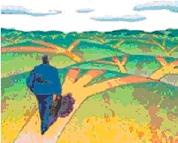

Déjà Vu and Physicist Julian Barbour
An old woman sits in her wheel chair in a nursing home, a photo album on her lap. She shows another old lady pictures of herself with her first beau on the village green, of herself in bridal gown, of her child sitting on her knee. She looks up at the bare walls, and sees somewhere herself at sixteen, turning many heads, her father carefully screening suitors at the door. It all happened so fast, first that and now this. She opens the album to a new page to show her husband in the year before he died, proudly washing their new Ford in the driveway.
Consume my heart away, sick with desire and fastened to a dying animal. (W.B. Yeats)
In Julian Barbour's world, every first date, every kiss, every senior prom, every marriage, every departing is repeated precisely and endlessly. Every hot dog at a baseball game will be eaten again and again. A teenager's coolness lasts forever.


